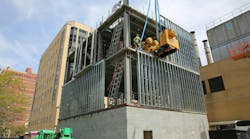Let’s face it, most job interviews for tradespeople go the same way. You ask the same questions, get similar answers, and don’t really get any sense of how this person will fit into our team. As long as they don’t raise any red flags, we typically hire them on, see how they perform, and, if they meet our basic requirements, retain them as employees.
But what if there was a better way to discover up-front if the person you’re interviewing is the right fit for your needs? And, just as important, are you a good fit for theirs?
In this day and age, employees are your make-it or break-it resource. Project labor is what drives a project’s success or failure. Productive employees who have the company’s best interests at heart are what we’re all looking for. But how do we get a sense of a candidate’s work ethic and capacity for loyalty in a 15-minute conversation?
For starters, throw out the old questions, and set the stage for a more connected conversation. Silence our cell phones, and ask them to do the same. Close the office door, and let them know that you truly want to get to know them and are interested in what they have to say. Just like construction, you have to have a solid foundation in order to build something.
Don’t try to explain to them what you’re looking for in a candidate; this will just muddy the waters as they try to find a way to relate their experiences to fit the picture of your ideal candidate. This doesn’t help either of you. Instead, ask probing and open-ended questions, such as:
- Tell me about your role on your last/current project.
- What did/do you enjoy most about your role there?
- What was something you struggled with?
- What was the last thing that didn’t go as planned on the project, and how did you deal with it?
- What is your favorite type of work to perform?
- Do you prefer to be in charge of a team, or part of a team?
- Tell me about a creative solution you came up with for a problem.
- What gives you a sense of pride at the end of a day?
- What do you like to do for fun? To relax?
These types of questions allow the candidate to tell you about themselves and who they are —not how many feet of pipe they can install in a day or what kind of tools they own. By giving them a chance to talk about themselves, tell you what they like, what they’re proud of, and what they’ve struggled with and overcome, you’ll start to get a sense of who they really are and how they might fit into your organization.
They’ll also get a sense of who you are as an employer — someone who’s building a team and is looking for partners, not just workers; someone who’s interested in them as a person, who wants to learn about them and wants them to succeed.



